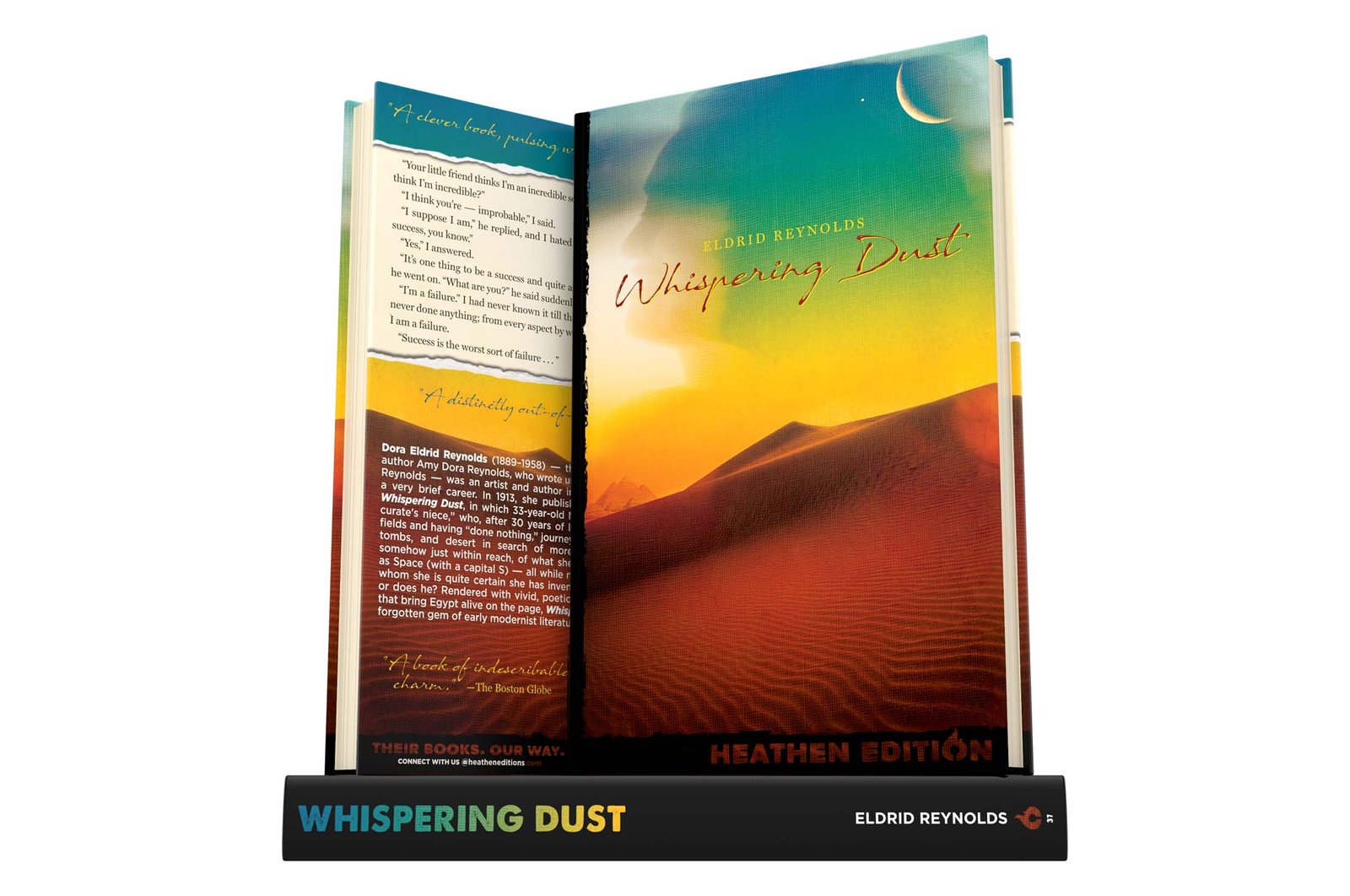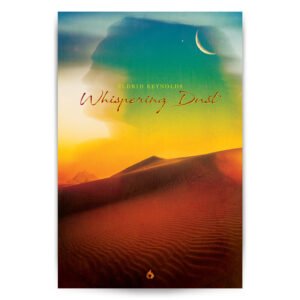No products in the cart.

Whispering Dust
Spine #37
Author
Eldrid Reynolds
Translator
First Edition
1913
Heathen Edition
August 31, 2023
Refreshed
Pages
302
Heathen Genera
Existentialicious
Paperback ISBN
978-1-948316-37-8
Hardcover ISBN
978-1-963228-37-3
“Your little friend thinks I’m an incredible sort of person,” he remarked. “Do you think I’m incredible?”
“I think you’re — improbable,” I said.
“I suppose I am,” he replied, and I hated the satisfied way he said it. “I’m a success, you know.”
“Yes,” I answered.
“It’s one thing to be a success and quite another to make a success of things,” he went on. “What are you?” he said suddenly.
“I’m a failure.” I had never known it till then. But of course I am; I see it. I’ve never done anything; from every aspect by which a woman is judged, and rightly, I am a failure.
“Success is the worst sort of failure . . . ”
Dora Eldrid Reynolds (1889–1958) — the daughter of artist, poet, and author Amy Dora Reynolds, who wrote using the nom de plume Mrs. Fred Reynolds — was an artist and author in her own right, albeit one with a very brief career. In 1913, she published her second and final novel Whispering Dust, in which 33-year-old Naomi, “a curate’s orphan and a curate’s niece,” who, after 30 years of living amongst grime and turnip fields and having “done nothing,” journeys to Egypt to wander its streets, tombs, and desert in search of more, of something intangible yet somehow just within reach, of what she can only inadequately express as Space (with a capital S) — all while narrating the story to You, a man whom she is quite certain she has invented and who does not exist . . . or does he? Rendered with vivid, poetic prose and colorful descriptions that bring Egypt alive on the page, Whispering Dust is an overlooked and forgotten gem of early modernist literature.
Test Your Might
Paperback
OTHER RETAILERS
Rate & Shelve It
Hardcover
OTHER RETAILERS
Rate & Shelve It
"A book of indescribable charm."
The Boston Globe
Heathenry
Contents
Praise
Details
Heathenry
As for the text, we have updated several hyphened words to reflect their modern usage: to-day is now today, to-night has become tonight, and so on.
We have also combined and condensed the book’s original 28 footnotes with our own since most of the originals were translations or explanations of Arabic words or phrases, which we have sometimes expanded on, and because a few of the originals were duplicated. In addition to those originals, we have added over 180 footnotes of our own for a grand total of 212, which we believe will prove useful as most of the story takes place in Egypt and delves into a fair bit of Egyptology.
We’ve also added some period-specific images to help better establish how two of the story’s locations appeared at the time of this book’s original publication in 1913.
Finally, we are very much in agreement with a notion found in Frederic Taber Cooper’s introduction: “There can be no half measures in any reader’s attitude toward this book: it will either leave you cold, speaking to you in an unknown tongue, or else you will hail it with delight, as one of those rare and delicious discoveries, to be lingered over and reverted to, again and again, with ever new and infinite appreciation.”
We are most assuredly of the latter because we’ve found that this book has lingered with us long after finishing it.
Additionally, Mr. Cooper is exactly right when he states: “Do not be impatient with its subtle vagueness, do not be in too great haste to pluck out the heart of its mystery. . . .”
Eldrid herself even pinpoints why one should avoid haste while reading this book, we believe, when she says: “We move slowly. ‘El agela minin esh Shaitan,’ the Arabs say.”
A phrase that translates as: Haste is from the devil.
A phrase certainly worthy of rumination. . . .
If you’d like to learn more about Eldrid, check out the Whispering Dust Heathenry.
Contents
Heathenry: Thoughts on the Text
Introduction by Frederic Taber Cooper
Whispering Dust
Introduction by Frederic Taber Cooper
Whispering Dust
Praise
“Whispering Dust by Eldrid Reynolds is a book of indescribable charm, which is all the more enjoyable because of its elusiveness.” —The Boston Globe
“A clever book, pulsing with life and emotion . . . laid amid the color, mystery and terror of Egypt.” —The Observer
“A distinctly out-of-the-way novel.” —The Publishers’ Weekly
“The charm is not felt at first — but grows steadily as one progresses with this tale of the young woman who goes to Egypt — to the desert — to seek space and to find herself . . . The book speaks to all lonely women — to all who long to give and know not to whom to give — who long to seek — and know not how to seek . . . this book is of such compelling power that one will long for Egypt — to go there, to live there, to experience that call of the desert that this woman felt.” —Mabel Margaret Hoopes, The Book News Monthly
“There can be no half measures in any reader’s attitude toward this book: it will either leave you cold, speaking to you in an unknown tongue, or else you will hail it with delight, as one of those rare and delicious discoveries, to be lingered over and reverted to, again and again, with ever new and infinite appreciation.” —Frederic Taber Cooper (from his Introduction)
“Whispering Dust is a novel which has caused somewhat of a controversy among the reviewers.” —The Birmingham Age–Herald
“Miss Eldrid Reynolds has the true art of the novelist . . . In the present story she has chosen to interpret a very difficult phase of emotion, and one that will not be immediately appreciated by every class of reader . . . Yet, in spite of a certain vagueness of touch, she succeeds to a remarkable degree in interpreting the undefined yearnings of a woman’s heart . . . This is a very clever, rather subtle, and highly imaginative story. Women with a temperament will adore it; while those men, who profess themselves unable to understand women, will perhaps learn something more from its pages of the inscrutable enigma of femininity.” —The Daily Telegraph
Details
Whispering Dust
Heathen Edition #37Format: Paperback
Interior: Black & White on Cream Paper
Pages: 302 (+2 POD)
Language: English
Annotations: 212 Footnotes
Illustrations: 5
@heatheneditions #heathenedition
Copyright © 2025 Heathen Creative, LLC. All rights reserved.


